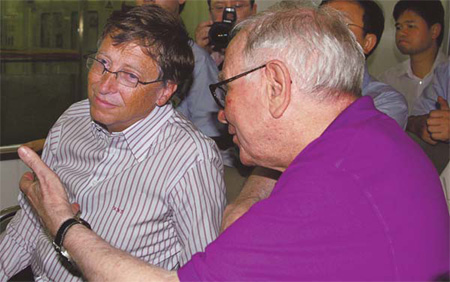China
Banquet is 'a test of Chinese rich'
By Wang Zhuoqiong (China Daily)
Updated: 2010-09-29 07:48
 |
Large Medium Small |
|
Bill Gates (left) and Warren Buffett visit the battery examination center of BYD Auto in Huizhou, Guangdong province, on Tuesday. [Photo/Xinhua] |
BEIJING - Amid the weeks-long buzz created by the visit of US billionaire philanthropists Bill Gates and Warren Buffett, the most pressing question is: Guess who's coming to dinner on Wednesday evening?
Beijing Chateau Laffitte Hotel, a European-style lodging house in the north suburbs of the city, is reported to be hosting the Chinese and American super-rich guests starting at 5 pm.
Details of the "private gathering" between the Chinese rich and two of the richest Americans remained mostly secret. The attendees are still unknown.
The banquet - dubbed by local media as the Hongmen Banquet, a historical anecdote indicating a feast or meeting set up as a trap for the invited - has ignited a fierce debate on the merits and difficulty of philanthropy and charity for the country's newly wealthy.
Only a few of the 50 Chinese billionaires on the invitation list have publicly answered the call, with names including "China's No 1 philanthropist" Chen Guangbiao, CEO of Jiangsu Huangpu Recycling Resources Co Ltd, who is worth an estimated $440 million according to last year's Hurun rich list.
Also among the confirmed names are dairy giant Niu Gensheng, kungfu movie actor Jet Li, car maker Wang Chuanfu, real estate developer Zhang Xin, glass maker Cao Dewang and e-commerce titan Ma Yun.
China is second to the United States in number of billionaires.
But many of the Chinese titans invited to the dinner have been slow to respond to the event due to their fears of being pressured to donate.
Property developer Wang Jianlin has shunned the invitation, saying it is more important to build a stronger company to help more Chinese people than donating money now.
Software magnate Gates and investment baron Buffett insisted in a letter to Xinhua News Agency earlier this month that they will not pressure China's super-rich to give away their money at the banquet.
The two, who have succeeded in calling on 40 wealthy individuals and their families - including CNN founder Ted Turner and New York City Mayor Michael Bloomberg - to hand over more than half of their fortunes this June, said they hope simply to learn about China's approach to philanthropy on Sept 29.
Whatever the approach, the timing is good for Chinese rich to put their wealth back into society, experts say. China's Gini coefficient, a measure of income inequality, has been above the 0.4 benchmark since 2000, an alarming level that is far above most industrial countries' levels between 0.24 and 0.36.
"With the gap between the rich and poor becoming wider, charity is an excellent and voluntary way to redistribute wealth," said Zhou Qing'an, a researcher with Tsinghua University.
Giving is not new to the Chinese rich.
In 2009, charity donations reached about 33.27 billion yuan ($ 4.89 billion), with nearly 60 percent of the donations from businesses, according to the Ministry of Civil Affairs.
The top 50 philanthropists donated nearly 3.9 billion yuan in total last year, according to the 2009 Hurun Philanthropy List, four times the figure from six years ago.
But the environment is not ready in China for rich people to donate large sums of their fortune, where the progress is mainly led by the government and driven by the public, said Wang Zhenyao, director of the Center for Philanthropy Research at Beijing Normal University.
Donations from rich people are still not popular in China, partly because of their fears that their fortunes will be exposed, and because China's charity systems are still underdeveloped.
"The banquet is not only a test of the Chinese rich, but also a test to our charity environment and system," Wang said.
Chinese rich people cast doubt on the transparency of charity operations. For example, very few of the country's growing number of charity organizations and foundations offer feedback to the donors or publish the money flow, said Wang.
Movie star Jet Li told Reuters on Tuesday that China needs a philanthropy law in order to give reassurances to would-be donors.
Li's One Foundation, a partner with the Red Cross Society of China, has been unable to get government approval to set up as an independent charity.
"Creating a foundation in China is just like driving a car on the freeway, but there are no red or green lights, only yellow. I've been driving through yellow lights for three years, and don't know if the next one will be red or green," he said.
Reuters contributed to this story.
China Daily
